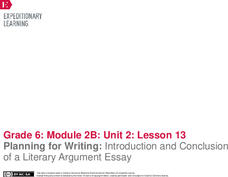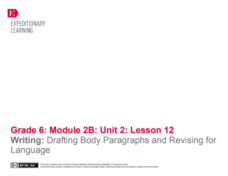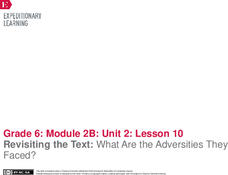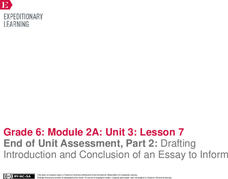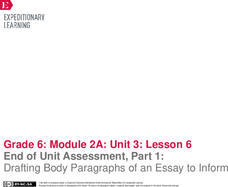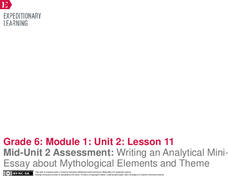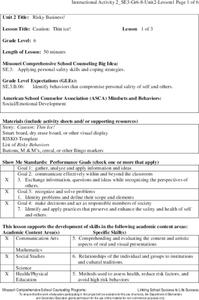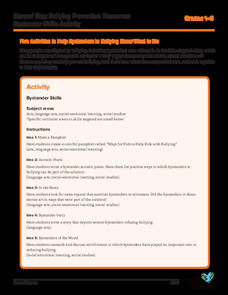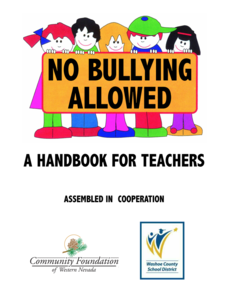J. Paul Getty Trust
Exhibiting Common Threads
Artists working in different media often explore the same themes—to model how these same themes weave their way through different forms of artistic expression, scholars analyze images by Dorothea Lange, identifying key themes in her...
EngageNY
Planning for Writing: Introduction and Conclusion of a Literary Argument Essay
Give a powerful introduction. Scholars analyze the introductory paragraph in the model essay "Are We Medieval?: Opportunities in the Middle Ages and Today." They discuss the key components the author includes and then walk through the...
EngageNY
Writing: Drafting Body Paragraphs and Revising for Language
This is a formal affair. Scholars take a look at using formal writing in essays. They analyze the model essay Are We Medieval?: Opportunities in the Middle Ages and Today? They then begin working on the first draft of their own essays.
EngageNY
Examples from Life Today
Does that happen in real life? Scholars look at their Themes of Adversity graphic organizers and think of examples in today's world for each type of adversity. They determine if today's world has the same struggles as those in the Middle...
EngageNY
Revisiting the Text: What Are the Adversities They Faced?
Where's the evidence? Scholars take a look at the evidence section of a Literary Argument Essay Rubric. They discuss terms used in the rubric and then begin thinking about collecting evidence for their own essays. They also revisit their...
EngageNY
Qualities of a Strong Literary Essay
Put it all into words. Scholars work toward writing an argumentative essay. They begin by examining and marking strong words in Are We Medieval? A Literary Argument Essay Prompt. Learners then use Qualities of a Strong Literary Argument...
EngageNY
Drafting Introduction and Conclusion
In conclusion ... Scholars analyze the model essay Adversity Faced by Townspeople in
the Middle Ages to gain a better understanding of introductory and concluding paragraphs. After studying the author's strategies, learners begin writing...
EngageNY
End of Unit Assessment: Final Essay
This is just the transition phase. Scholars participate in a mini lesson about using transitions in writing. They then have a brief peer critique of the introduction and conclusion paragraphs for their end of unit assessment. Learners...
EngageNY
Drafting Body Paragraphs
That's just the style. Learners begin with a mini-lesson about formal writing style. They then use what they learned about formal writing to begin the body paragraphs for their End of Unit 1 Assessment Prompt: Adversity in the Middle...
Teaching Tolerance
In Our Own Words: A Story Book with a Purpose
Academics turn into storytellers in an engaging activity on activism. The activity focuses on promoting social change in local communities with stories. Young historians plan a storybook to target a specific audience and social issue and...
EngageNY
End of Unit Assessment, Part 2: Drafting Introduction and Conclusion of an Essay to Inform
A powerful introduction and conclusion can really pack a punch. Using the resource, scholars first read and discuss a model essay. Then, as part of the end of unit assessment, they draft the introductory and concluding paragraphs of...
EngageNY
End of Unit Assessment, Part 1: Drafting Body Paragraphs of an Essay to Inform
Anybody can write a body paragraph! Pupils analyze the development of ideas in a body paragraph from a model essay. Next, using what they've learned, they draft the body paragraphs of their My Rule to Live By informative essay.
EngageNY
Analyzing the Structure and Content of an Essay to Inform
Outlines are a great asset to essay planning. Scholars read and analyze a model essay about the importance of daily reading and consider how it would look in an outline format. Next, they outline their own informative essays about rules...
EngageNY
End of Unit Assessment: Final Draft of Hero’s Journey Narrative
All journeys must come to an end. Using the final lesson in the series, pupils analyze a model narrative for use of transitional words and phrases. Next, they apply their learning to their final drafts of their hero's journey narrative.
Learning to Give
Deliver Gratitude Day
Gratitude is the focus of a discussion that sets the stage for pupils to take part in a service-learning project in which they deliver notes of kindness by way of social media or mail. A reflection closes the learning experience.
Centervention
What Makes Me Happy Today?
Here's a worksheet that will put sunshine on papers and smiles on the faces of young learners as they draw pictures and write a short explanation of what makes them happy today. A great way to show gratitude for the good things in life.
EngageNY
Mid-Unit 2 Assessment: Writing an Analytical MiniEssay about Mythological Elements and Theme
Two is company. Scholars pair up to continue their mini essay writing from the previous instructional activity. They work on their introduction and conclusion paragraphs and then trade partners for peer feedback and a fresh set of eyes...
EngageNY
Selecting Evidence and Partner Writing: Aligning “The Hero’s Journey” and The Lightning Thief (Chapter 5)
Around and around we go! Scholars work in groups to connect The Hero's Journey and The Lightning Thief with a Carousel of Quotes activity. They then independently reflect on the two texts and answer questions about how they connect to...
Missouri Department of Elementary
Caution: Thin Ice!
Sixth graders listen to a story titled "Thin Ice!" then partake in a whole-class discussion asking and answering questions about what was read. Scholars brainstorm risky behaviors in preparation for a game of RISKO—a game similar to...
Committee for Children
Five Activities to Help Bystanders to Bullying Know What to Do
Five activities covering ELA, social studies, and social and emotional learning offer bystanders tips and the courage to help individuals being bullied. Activities include writing an acrostic poem, creating a pamphlet, reading current...
Missouri Department of Elementary
My Problem…Your Problem…Our Problem
Encourage sixth graders to take responsibility for their actions and become a problem solver. Pupils discuss new problems faced in sixth grade then identify ones that involve other people. A worksheet guides their practice in conflict...
National Woman's History Museum
Martha Hughes Cannon: Doctor, Wife, Mother, Senator
Each state is entitled to two statues in the National Statuary Hall Collection in Washington, D.C. After reading about Utah's debate over whether or not Martha Hughes Cannon should be represented by one of their statues, individuals...
PBS
Latino Americans Share Their Experiences
Three Latino Americans are the focus of an interactive that spotlights their accomplishments. Scholars get to know Lin-Manuel Miranda, Judy Reyes, and José Hernández through short informative text and videos. Participants read, take...
Community Foundation of Western Nevada
No Bullying Allowed
Through discussion, role play, read-alouds, writing, and more, scholars explore the concept of bullying and practice having courage while responsibly reporting unfriendly behavior. Friendship and respect are practiced and encouraged. ...



